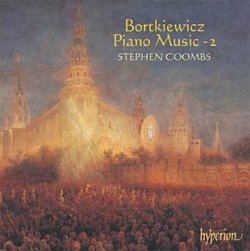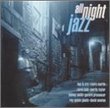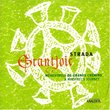| All Artists: Bortkiewicz, Coombs Title: Piano Music 2 Members Wishing: 0 Total Copies: 0 Label: Hyperion UK Release Date: 10/10/2000 Album Type: Import Genre: Classical Styles: Chamber Music, Forms & Genres, Ballads, Historical Periods, Classical (c.1770-1830) Number of Discs: 1 SwapaCD Credits: 1 UPC: 034571170947 |
Search - Bortkiewicz, Coombs :: Piano Music 2
 | Bortkiewicz, Coombs Piano Music 2 Genre: Classical
|
Larger Image |
CD DetailsSimilar CDs
|
CD ReviewsAn Enterprising follow-up warmly and affectionately played! David A. Hollingsworth | Washington, DC USA | 12/02/2000 (5 out of 5 stars) "Stephen Coombs continues with his priceless survey of Russian piano works with those of Sergei Eduardovich Bortkiewicz (1877-1952) in the second of two volumes. If you enjoy and admire, say, the romantic, flamboyant First Piano Concerto in B-flat Major op. 16 passionately played by Coombs and the BBC Scottish Symphony and his Lamentations and Consolations (in Volume I also performed by Coombs, all recorded by Hyperion), then there's plenty to enjoy here. Bortkiewicz' music in general, though lacking the ultimate stamp of originality, has much individuality, melodic invention, and some impulsive communicative exuberance. His music is spirited and has integrity and this compact disc should do much to awaken interests of his works.The Ballad in C sharp minor and the Elegie in C sharp major (1931-1932) shows some influence of Tchaikovsky and Rachmaninov. Give a close listen to Rachmaninov's Second Piano Concerto and you'll notice Bortkiewicz' Ballad and Elegie echoing the style and spirit of the Concerto. The echoes, though not strong, are enough for those not familar with Bortkiewicz music to deem the works as derivative. But, as Stephen Coombs argue: "...both pieces have that unmistakable Bortkiewicz soundscape and it is worth remembering that Rachmaninov's now celebrated Concerto was largely unknown to concert audiences in the early thirties." I agree!The Quatre Morceaux op. 3 (1906) are altogether noble and passionate set of piano works. The Cappricio in F sharp (con fuoco) is Tchaikovskian and Rubinsteinian in its sense of majesty and fire(especially in regards to the architecture). The Etude in F-sharp (allegro non-troppo) reminiscene more of Glazunov (especially in the Three Etudes) while the Gavotte-Caprice comes into the oriental world of Glinka and Balakirev, with some dancelike, noble passages of Arensky. The last piece, Primula Veris in F (con moto) goes back to Glazunov's last of the Three Etudes and Arensky's Le ruisseau dans la foret from 24 Characteristic pieces op. 36 in its restrained, poetic, and elegant melody. The Quatre Morceaux op. 65 (1947) hardly shows any advancement of Bortkiewicz' musical development from the op. 3, though the composer's melodic invention and integrity remain firmly intact. The First piece, Chant sans Paroles (Andante con moto) is noble and easygoing, quite in the sound world of Tchaikovsky and Schumann. The Etude in E (allegro vivace) is Chopinesque while the Epithalame, pour la main gauche seule in C (Andante co moto) is meditative and shares some of the Tchaikovskian sentamentality of the first piece. The Capriccio alla Polacca (Allegro) is a demanding polonaise in the tradition of Chopin, rather virtuosic with the middle section with some restraints and individuality.The Sonata in B major op. 9 (1909) is conventional in terms of structure and musical ideas. The First movement is pasionate and somewhat rant. But the Andante mesto e molto espressivo second movement is the most impressive and with great emotional depth, with the bars fill with subdued, melancholic expressions throughout. The last movement, Presto, is tuneful, but not as memorable as the Second. Although Bortkiewicz may lack some of the inspirations so much common with the works of Tchaikovsky and Balakirev, or the ultimate sense of originality you'll notice in the works of Borodin, Mussorgsky, Rachmaninov, or Scriabin (and to some extent Glazunov and Arensky), or the ultimate sense of majestic exuberance of Rubinstein, his music continues to contain outflows of fine musical ideas. Personally, his slow movements are his best. However, being acquainted with his music will yield more rewarding satisfaction, especially aided by Stephen Coombs, a great, eminent pianist, who provided warm and affectionate performances of the works and his well-written booklet essay accompaning this well recorded Hyperion compact disc. I eagerly await the next installment(s) and hope that Coombs or Marc-Andre Hamelin turn their attention to the piano works of Lyapunov and Lyadov. Recommended, with enthusiasm!" More charming Bortkiewicz Evan Wilson | Cambridge, MA | 10/23/2000 (4 out of 5 stars) "I've been awaiting Volume 2 of Stephen Coombs' look at the little-known Russian composer Sergei Bortkiewicz for awhile now. With one small cavil, it proves to be just as enjoyable as the first disc.If you didn't read my review for the other disc, Bortkiewicz's music sounds a lot like Rachmaninov in its rich harmony and lush keyboard textures. This disc confirms an earlier impression that Bortkiewicz may be a slight bit more outgoing then Rachmaninov; a little less pensive and melancholy. It also suggests that his true metier was the character piece.Contained on this disc are a Ballade and Elegie which crib affectionately from Rachmaninov's 2nd Piano Concerto. These are followed by two sets of pieces from early and late in the composer's career which sound strikingly similar. (Rachmaninov's late music sounds spikier than his early pieces, but Bortkiewicz apparently decided to completely ignore the 20th century.) Among these morceaux are a charming, and somewhat jazzy, Gavotte-Caprice written for the composer's mother, and several attractive etudes.The big piece on the disc is a Sonata in the uncommon key of B Major. It is here where we find Bortkiewicz's failings. The large opening movement contains much thrashing about, but little to hold one's attention. The piece is redeemed by a lovely Andante and a whiz-bang finale crammed with hy-jinks. The opening movement, however, indicates that Bortkiewicz wasn't really up to the BIG statement.Be that as it may, most of the music on this disc is charming and entertaining and is played to the hilt by Coombs. If you bought the first disc, you won't need my recommendation for the second. If you didn't, buy either and beware...you may feel compelled to shell out for the other one after you've heard Bortkiewicz.PS. I just love the cover art on these Russian Romantic Piano disc from Hyperion. Normally you shouldn't judge a book by its cover, but in the case of this series, all the discs live up to the wonderful cover art!!"
|

 Track Listings (13) - Disc #1
Track Listings (13) - Disc #1
